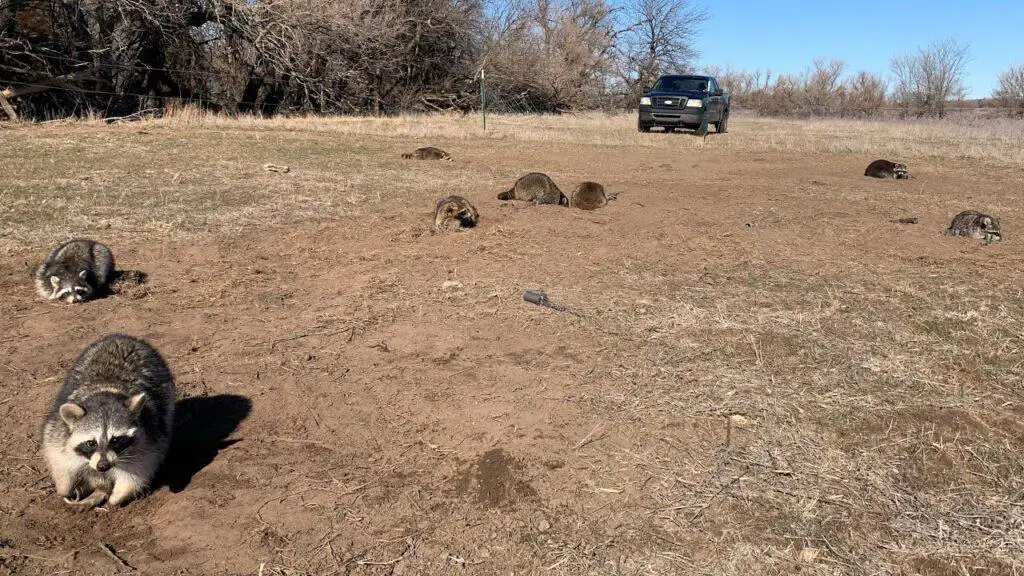The presence of raccoons in Texas can lead to various challenges, but understanding the laws and exploring humane alternatives is essential.
In this article, we delve into the legal aspects of raccoon management in Texas and present viable alternatives to lethal measures.
By navigating the regulations and adopting responsible practices, residents can peacefully coexist with raccoons while preserving the state’s diverse ecosystem.
Is It Possible to Kill Raccoons in Texas

In accordance with Texas wildlife regulations, hunting, trapping, and killing raccoons are typically illegal without a hunting and trapping license. However, exceptions exist:
- Nuisance Animals: You can legally kill raccoons without a license if they are causing property damage or endangering human health and safety.
- Relocation Option: If you prefer capturing and relocating the raccoon instead of killing it, you can do so without needing a hunting or trapping license.
- Live Trapping: While live trapping is allowed, it’s crucial to note that relocating the trapped raccoon is illegal. Instead, you have the option to euthanize it.
In other words, you can legally kill a raccoon in Texas if it’s considered a nuisance animal, but a hunting and trapping license is required for other circumstances.
As an alternative and humane approach, consult our comprehensive guide on ‘How to Get Rid of Raccoons.’
Risks of Killing Raccoons in Texas
Killing raccoons in Texas presents multiple risks, encompassing legal consequences, health hazards, and environmental concerns. Here’s an overview of the associated risks:
- Legal Consequences: Unless you possess a hunting and trapping license, it is illegal to hunt, trap, or kill raccoons in Texas, except for nuisance animals causing property damage or threatening human safety. Violating these regulations can lead to legal penalties, including fines and criminal charges.
- Health Hazards: Raccoons may carry diseases, such as rabies, which can be transmitted to humans through bites or scratches. Handling or killing raccoons without proper protection puts you at risk of contracting these diseases.
- Environmental Impact: Raccoons play a vital role in the ecosystem, and their removal can disrupt the natural balance. Exploring alternative solutions like live trapping and relocation is essential before considering lethal measures.
- Safety Risks: Killing raccoons can be hazardous, particularly if you lack experience in handling firearms or other weapons. It is crucial to adhere to safety protocols and use appropriate equipment when dealing with nuisance animals.
Killing raccoons in Texas carries significant legal, health, environmental, and safety risks. Prioritizing alternative solutions and following proper procedures is essential to mitigate these potential dangers.
Alternatives to Killing Raccoons in Texas
There are multiple humane alternatives to killing raccoons in Texas exist, such as:
- Live Trapping: Employ cage traps for humane raccoon removal. However, it’s vital to release the trapped raccoon on your property or euthanize it, as relocating live-trapped raccoons is illegal in Texas.
- Deterrents: Use effective deterrents to discourage raccoons from entering your property. Options include motion-activated sprinklers, bright lights, loud noises, and natural deterrents like cayenne pepper or ammonia.
- Habitat Modification: Raccoons are drawn to food sources, like garbage cans and pet food. Make your property less inviting by securing garbage cans and blocking potential entry points to your home, such as roof or wall openings.
- Professional Wildlife Removal: If self-removal proves challenging, enlist the services of professional wildlife removal experts. They possess the skills and equipment needed for safe and humane raccoon removal.
As you can see there are humane alternatives available to address raccoon issues in Texas. It’s essential to explore these options before resorting to lethal methods, considering the potential legal, health, environmental, and safety risks associated with raccoon killing.
Professional Services That Can Help Remove Raccoons in Texas
Indeed, numerous professional services are equipped to assist with raccoon removal in Texas. Here are notable examples:
- Texas Wildlife Control: This company offers expert wildlife removal services, covering various animals like bees, bats, birds, snakes, and raccoons.
- Wildlife, Inc: Established in 2000, this company specializes in humane wildlife removal and has been serving Texas communities for over two decades.
- Wildlife Removal: The largest and most trusted wildlife control company in Texas, with an extensive network of over 50 state locations, providing round-the-clock, year-round service.
- Wildlife Pros: With over 20 years of experience, this company excels in humane wildlife removal, handling animals such as snakes, raccoons, squirrels, foxes, skunks, and bats.
- Dallas Wildlife Removal and Trapping: Serving the Dallas area, this company focuses on wildlife removal and trapping for raccoons, squirrels, and bats.
- Urban Jungle Wildlife Removal: Operating in Houston, Austin, and San Antonio, this company caters to both residential and commercial properties, including raccoon removal services.
Texas offers a range of professional wildlife removal services, ensuring the safe and humane removal of raccoons and other nuisance wildlife.

